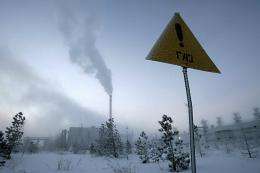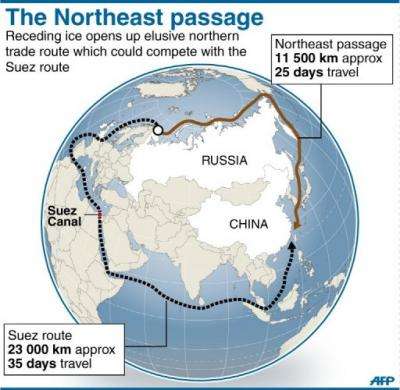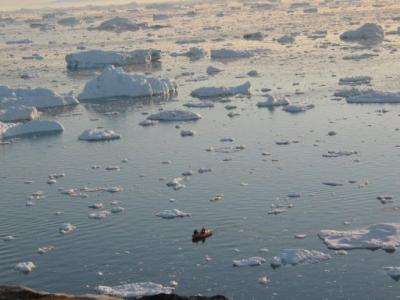The Arctic: a new frontier for oil, gas firms

BP's deal with Rosneft to jointly explore the Arctic's huge oil and gas reserves sets out a new frontier in the race for resources, but one that is dogged by technical and environmental concerns.
More than one fifth of the world's undiscovered but technically recoverable reserves of hydrocarbons are located north of the Arctic Circle, according to the US Geological Survey (USGS).
The region accounts for about 13 percent of the world's undiscovered oil and 30 percent of the undiscovered natural gas, USGS data shows. About 84 percent of the resources occur offshore, trapped below the icy waters.
After its disastrous oil spill in the Gulf of Mexico, BP hopes to secure its future with the January 14 deal with state-owned Russian firm Rosneft, which gives it access to 125,000 square kilometres of sea in the Russian Arctic.
For Western firms struggling to access known reserves, particularly in the Middle East, the British oil giant's move highlights the potential of a largely untouched new frontier.
"The potential is there, but exploring requires risk-taking," said Manouchehr Takin, senior analyst at the Centre for Global Energy Studies (CGES) in London.
"The costs are high, much higher than elsewhere, and the summer seasons are short, so it takes a long time."
Jonathan Jackson, analyst at stockbroker Killik & Co, suggested that the drilling window was about 100 days a year because of the winter ice.
"The early-stage nature of the assets and the limited drilling window available in the Arctic means production is a long-way off," he continued.
BP itself has said that it does not expect to produce its first barrel of oil in the Rosneft venture until 2020.
But while it may be a long game, the competition is well underway.
When Greenland asked for bids for the latest round of exploration licences last year, 12 international companies put in an offer, including ConocoPhillips of the United States, the Anglo-Dutch oil giant Shell and France's GDF Suez.

Exploration off Greenland has yet to produce any commercially exploitable reserves, but that did not stop British firm Cairn from boosting its investment there by one billion dollars on the back of "encouraging" first results.
Alaska, where the Prudhoe Bay oil field has been operating since 1977, is currently the most exploited area of the Arctic and its wells are responsible for more than one tenth of the oil production of the United States.
But drilling there has been hugely controversial and environmental campaign group Greenpeace was quick to condemn BP and Rosneft's new venture in the Russian Arctic.
"Any company that drills for oil in the Arctic forfeits any claim to environmental responsibility. An oil spill in the cold waters of the Arctic would be catastrophic and extremely difficult to deal with," it said.
A report last November by the US group Pew Environment suggests that nothing can prepare energy companies for the hostile environment of the Arctic, where violent winds whip up nine-metre waves and icebergs clutter the waters.

BP says that its experiences in deepwater drilling in the Gulf of Mexico and Alaska mean it is well equipped for the task.
But its critics are not reassured, noting both the Gulf oil spill and a spill in Alaska in 2006, where BP's US subsidiary was blamed for leaking 760,000 litres of oil on the tundra and on a frozen lake.
The situation is further complicated by the geopolitical tensions that surround the Arctic, as border countries Russia, Norway, the United States, Canada and Denmark (via Greenland) battle it out to stake their claims.
Global warming is also providing new opportunities all the time as the Arctic ice melts. In August, a Russian oil tanker set off for China on a previously impassable route through the Arctic ocean.
(c) 2011 AFP


















